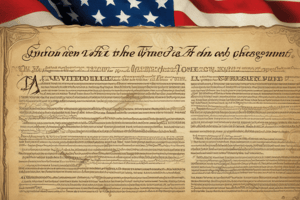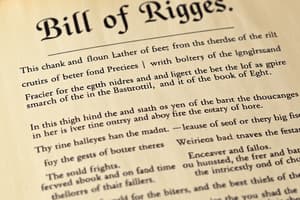Podcast
Questions and Answers
What does the First Amendment protect?
What does the First Amendment protect?
- Protection against unreasonable searches and seizures
- Due process in legal proceedings
- Freedom of speech and religion (correct)
- Right to bear arms
Which amendment emphasizes the importance of privacy and due process in legal proceedings?
Which amendment emphasizes the importance of privacy and due process in legal proceedings?
- Second Amendment
- Fourth Amendment (correct)
- Eighth Amendment
- Sixth Amendment
What does the Second Amendment guarantee to Americans?
What does the Second Amendment guarantee to Americans?
- Right to bear arms (correct)
- Right to free speech
- Right to a fair trial
- Protection against cruel and unusual punishment
Which amendments establish the foundation for due process in the legal system?
Which amendments establish the foundation for due process in the legal system?
What is the main purpose of the Bill of Rights?
What is the main purpose of the Bill of Rights?
Which amendment prevents the government from establishing a state religion?
Which amendment prevents the government from establishing a state religion?
What does the First Amendment protect in terms of freedom of speech?
What does the First Amendment protect in terms of freedom of speech?
Which of the following is NOT protected under the freedom of speech in the First Amendment?
Which of the following is NOT protected under the freedom of speech in the First Amendment?
What right does the First Amendment guarantee related to religion?
What right does the First Amendment guarantee related to religion?
Which aspect of rights is protected against unreasonable searches and seizures?
Which aspect of rights is protected against unreasonable searches and seizures?
What does the right to bear arms refer to?
What does the right to bear arms refer to?
What does due process ensure in the legal system?
What does due process ensure in the legal system?
Flashcards are hidden until you start studying
Study Notes
Bill of Rights: A Foundational Blueprint for American Rights and Freedoms
The Bill of Rights, the first ten amendments to the United States Constitution, was ratified in 1791, establishing a framework of fundamental liberties and protections for the American people. Although not exhaustive, it serves as a cornerstone of our nation's legal system, instilling values within the Constitution itself and delineating core freedoms and rights. In this article, we'll explore the Bill of Rights' most influential clauses, focusing on freedom of speech, freedom of religion, protection against unreasonable searches and seizures, right to bear arms, and due process.
Freedom of Speech (Amendment I)
Freedom of speech is a cornerstone of American democracy, allowing us to speak, write, and share our thoughts without fear of government censorship. The First Amendment declares, "Congress shall make no law... abridging the freedom of speech." This amendment protects not only traditional forms of expression, such as verbal communication and written articles, but also more modern forms like social media posts and internet content.
Freedom of Religion (Amendment I)
The First Amendment also guarantees freedom of religion, ensuring that all Americans have the right to practice their faith without government interference. It states, "Congress shall make no law respecting an establishment of religion, or prohibiting the free exercise thereof." This clause prohibits the government from establishing a state religion and prevents the government from restricting individuals' religious practices.
Protection against Unreasonable Searches and Seizures (Amendment IV)
The Fourth Amendment protects Americans from unreasonable searches and seizures by the government. It states that the "right of the people to be secure in their persons, houses, papers, and effects, against unreasonable searches and seizures, shall not be violated." This amendment emphasizes the importance of privacy and due process in legal proceedings.
Right to Bear Arms (Amendment II)
The Second Amendment guarantees Americans the right to bear arms. It states that "a well-regulated militia being necessary to the security of a free state, the right of the people to keep and bear arms shall not be infringed." Although the exact meaning of this amendment is still debated, it generally protects individuals' right to own firearms for self-defense and other lawful purposes.
Due Process (Amendments V, VI, VII, & VIII)
The Fifth, Sixth, Seventh, and Eighth Amendments establish the foundation for due process, the fair and lawful treatment of individuals within the legal system. These amendments guarantee the right to a fair trial, the right to a speedy trial, the right to confront witnesses, the right to a jury trial, and the protection against excessive bail, fines, and cruel and unusual punishment.
These amendments are not exhaustive, but they form a solid foundation for American rights and freedoms. The Bill of Rights stands as a testament to the founding fathers' belief in the importance of protecting individual liberties within a democratic society.
As society evolves, so do our interpretations of the Bill of Rights. However, the fundamental principles of freedom, privacy, and fairness remain central to our nation's legal structure and cultural identity. By understanding the history and intent behind these amendments, we can better appreciate the incredible significance of the United States Bill of Rights and its ongoing influence on our lives.
Studying That Suits You
Use AI to generate personalized quizzes and flashcards to suit your learning preferences.




